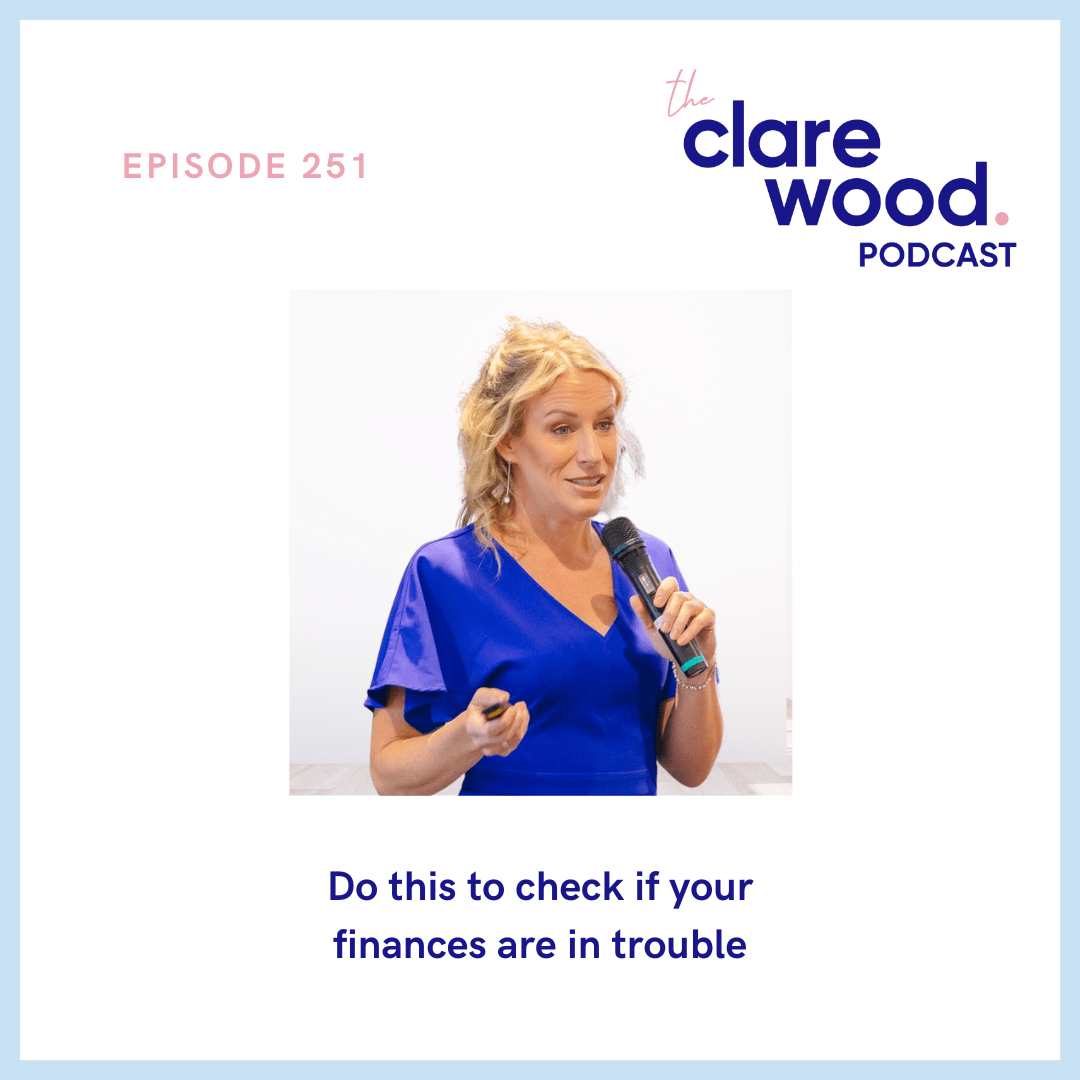If you’ve ever wondered how you are tracking when it comes to money, then tune in! In today’s episode, we are going to do something a little bit different, I’m going to take your through a process where you can do a behind-the scenes check on how exactly your business finances are going.
In this Episode:
01.49: What is an audit?
05.14: How to evaluate your own business – The mini-audit process:
- 05.50: Step 1 – Planning
- 06.30: Step 2 – Finances
- 07.33: Step 3 – Reporting
- 11.32: Step 4 – Risk Management
- 13.09: Step 5 – Processes
Links:
JOIN THE FREE 3 DAY CHALLENGE: Fix your FINANCES >
Transcript
Today on the podcast, we’re going to do something a little bit different. I’m going to take you through a process where you can do a bit of a behind-the-scenes check to see how exactly your business finances are going. If you’ve sometimes wondered how we’re actually tracking when it comes to my money you are going to need to stick around for this episode.
OK, let’s get started. I don’t know how you are coming to this podcast today, like what state your finances are in? Maybe you love money and your business is wildly profitable? Or maybe you have absolutely no idea what is going on behind-the-scenes. What we’re going to do today is we’re go through a process to check what kind of state your business finances are in. And the way we’re going to do that is we are going to do an audit of where you are currently at. So you have clarity around the true state of your business finances.
What is an audit?
Now you may be familiar with the term audit, but basically it means an objective evaluation of something, and specifically when we talk about an audit in the space of finances we are talking about an objective evaluation of your financial position, of your financial statements, of overall how your business finances are tracking.
So if you’ve ever worked in a corporate role, I am sure you have been through an audit process before. Now the way that an audit works, it is usually performed by an external party and it’s all about checking the accuracy of your report. So big companies have an audit process done as a way of saying to the public and their shareholders, hey, just to let that the numbers that we tell you are the truth, this is a real reflection of how the business is performing. Because obviously if you’ve bought shares in a company, if you’ve got a financial interest in it, you want to make sure that they’re not saying to you, yeah, cool, everything’s fine, and behind-the-scenes, it’s not so fine.
Now there’s a couple of different ways that audits can be done. There’s a process called internal audit, which is where people inside your company and if you are in a bigger company you will probably have an internal audit team and they come and they check your compliance with processors. They’re like, hey, are you doing the things that you say you’re doing and they’ll usually give you a report? So it says you need to get these things up to scratch.
An external auditor basically does the same kind of thing, but they are using that information to report back on. Perhaps a public scale, how you are performing. So it might say there’s a whole bunch of issues in the processes here. There’s some red flags in their finances over here.
And there’s also a government audit, which is if, for example, you get chosen by the tax office. The government agency and again depending what area, but let’s just assume it’s a taxation agency, they will come through and look through all your business finances. they will actually have a look and say, hey is what you’re putting on your tax returns actually accurate or not?
Some of the things that might be looked at during a an audit, they might come through cross check your reconciliation. So just a reminder, a reconciliation is where you put the thing that shows up on your bank statement into an account. For example I might have Qantas expense that comes out of my bank account and I put that into the account. And so the auditors might go and check and say, OK, are you doing that accurately? They might check are you collecting receipts? They might go and cross check your bank balances, is what you’re saying you should be in there actually in there. You tell them the truth there, so they’re cross checking processes and various bits and pieces like that.
How to evaluate your own business – The mini-audit process
For the purposes of today, obviously we’re not gonna go and do a proper internal audit process, but I do want to highlight a couple of different areas for you to go and evaluate in your business to see how you are tracking.
Let’s get started on your mini audit process.
Step 1 – Planning
The first thing that I want you to have a think about is planning. Do you have clear goals and objectives for the business? And do you have a budget or a financial plan in place? Now, I’ve been a money mentor for over 8 years now, but from my experience very, very, very few business owners have a plan in place. Have a plan saying yes, this is what I want to bring in in terms of my revenue and my expenses. So that’s the first thing that I want you to. Check do you have a plan in place?
Step 2 –Finances
The next thing we’re going to do is dive on into those finances. Do you have a decent accounting programme. Does it give you accurate information? Do you have a good finance team? Are they the right people to support you towards those goals that we mentioned just before? Are your accounts set up properly? Do you have the right accounts in place, both in terms of your chart of accounts or the account names that I mentioned earlier and also in terms of your business bank accounts, are they set up accurately set up on a way to support your growth and your compliance? Are your taxes up to date? And if you have a team or if you pay yourself a wage, is your payroll up to date? Is your super paid up to date and are they being done accurately?
Step 3 – Reporting
The next thing that I want you to have a bit of a think about is your reporting. The first question that I want to ask you is, how often are you running your financial reports? Primarily your balance sheet and your profit loss report. And do you go through and actually review them, ideally on some sort of a regular basis with a third or with an external party?
A lot of people I know say they only see their accountant once. Hopefully you are seeing your accountant more often than that, but do you sit down and actually have a look at the accounts and say, hey, this is what’s going on? There’s a couple of benefits of having good business reporting in place, obviously accuracy. You want to know that you’re actually performing the way that you think that you’re performing. You want to have awareness of any red flags that might be coming up. Or also maybe of any opportunities? You want to assess your company’s position. And one of the cool things that I talk about inside my course, The Profit Academy Foundations, is talking about trend analysis, identifying opportunities. When you know your numbers, you can use that knowledge to grow your numbers. If you’re not even looking at them, you don’t have that insight.
Another thing that I would really be questioning as part of this little mini audit that we’re doing is what metrics do you check? This might be a whole other podcast episode, but every month I do a metric meeting which is purely focused on looking at some of the numbers inside the business and saying hey, how are we tracking? What do we need to do to turn things around if we aren’t getting the results that we had hoped for?
With reporting, I believe you should run these every single month. Now why is that? Because it helps you to identify blind spots. It helps you to have an intimate knowledge of your business. And it’s also a good opportunity to check for mistakes. I just did a money talk all about this topic. Money Talk is my Instagram Live that I do every Thursday. by the way, it was about why you shouldn’t just blindly trust your accountant. And as I shared in that Money Talk, we are all humans, right? So people make mistakes, and one of the best ways that you can identify mistakes is to be cross checking. Even though I’m a spreadsheet guru, one of the things that I always do is get a second set of eyes across. Even if my client said to me, Yep, I’m really good at spreading. Like, hey, just let me have a little look. Mistakes are just part of the human experience. So getting across your numbers is a good opportunity to make sure that there aren’t mistakes because mistakes cost you money there’s something wrong in your accounts that is potentially money coming out of your pocket.
Step 4 – Risk Management
Let’s go on to the next one. Another thing that you can do inside this mini audit process is have a think about your risk management processes. Do you have a risk plan in place? What would you do? If yourself as a CEO or Managing Director, or someone in your team was injured, sick, or weren’t around anymore. What would you actually do? What’s your strategy to keep the business going? And just to be completely transparent here, I do not have a robust risk management plan in place. I have some loose ideas about what I would do if I lost key people inside my business or if something was to happen, like for example, a natural disaster or something like that. I do have some high level plans, but I haven’t actually gone through this process which again is something that you pick up in an audit. A good question to always ask something I ask my clients, do you have adequate insurance? Insurance is one of those terribly unsexy things until you need it. So do you have adequate insurance in place? And this is also kind of connected into that risk management plan. It’s one of the things that I do is I have insurance if I was to get injured so that we wouldn’t be unable to pay the mortgage or anything like that. I’m not saying that’s right for you or whatever, but it’s just something to think about.
Step 5 – Processes
Next thing in your mini audit to have a bit of a think about your processes. Do you have processes or is it just kind of things are known in the team and this is closely related to your risk management? Do you have processes and procedures written down of how things are done? How do you actually keep an eye on your pricing? And the margins that you are making? So this is even if you’re a service based business, this is very relevant to you because your team will undoubtedly get paid more over time because that’s what inflation is. People usually get pay rises, cost of living, all of those things. But are you still making an adequate margin on your team members? If you have a service that you own or sell, another thing, do you have a process in place to keep an eye on the market? To go and check your suppliers. I’ve seen a few times through clients of mine over the years that they have a company that they work with. They love them and that company knows they aren’t going anywhere. And guess what they do. They jack their prices until they are way above the market rates for the service that they are offering. So it can help to go out and have a look. What are other supplies out there charging?
Another process that you might want to do is go and have a look at your outstanding invoices. Does anyone owe your money? Do you have a process around chasing up outstanding invoices?
I know I’ve dumped a lot of information on you today. And I don’t expect you to go and do this mini audit straight away, but I just wanted to get the COGS ticking over about some of this stuff, because this is really important, and hopefully this process has given you some clues as to how you are going from a financial perspective.
Now, if things aren’t where you want them to be, I’d love to invite you to come along to my FREE upcoming challenge Fix your Finances. This is something I’m teaching live over three days. There’s an AM and a PM session, so hopefully no matter where you are in the world, there is a time that will suit you. And inside this training, you’ll learn why you can’t just leave this money stuff to your accountant, and hopefully today’s giving you a bit of insight into that. And you’ll also learn a little bit about the psychology of perhaps why you take the ostrich approach when it comes to your finances. Maybe you put your head in the sand. I’m also going to share with you the numbers you need to be across. And how you can stay across your finances in as little as 15 minutes a week. I am so excited to run this training. If you want to join, as I said earlier, it is free to join and you can do so via the link in the show notes for today’s episode.
Today we’ve spoken about your mini audit and the purpose of this wasn’t just a way to beat yourself up. It’s actually the reason why you need to know your numbers is because in your numbers are bread crumbs. It’s the clues to your success. If you want to make more profit, one of the best ways to do so is to really dive in and understand the numbers and the metrics inside your business.
Thank you so much for tuning in to today’s episode of the podcast and I look forward to chatting to you again next week.







